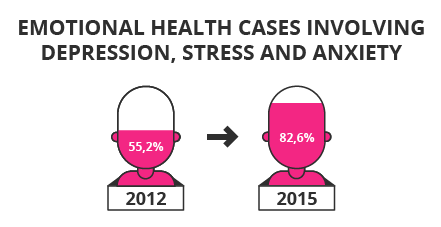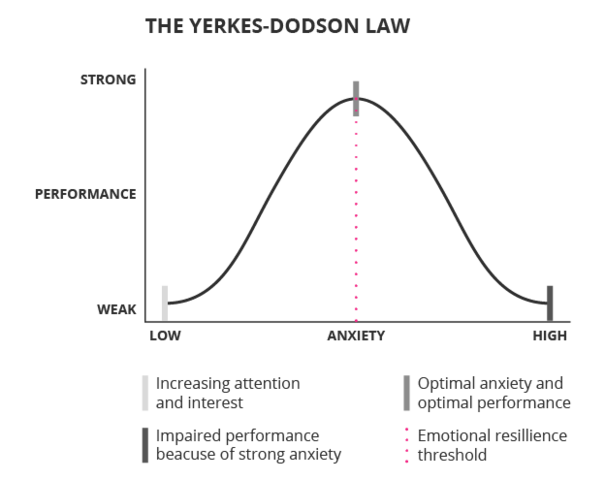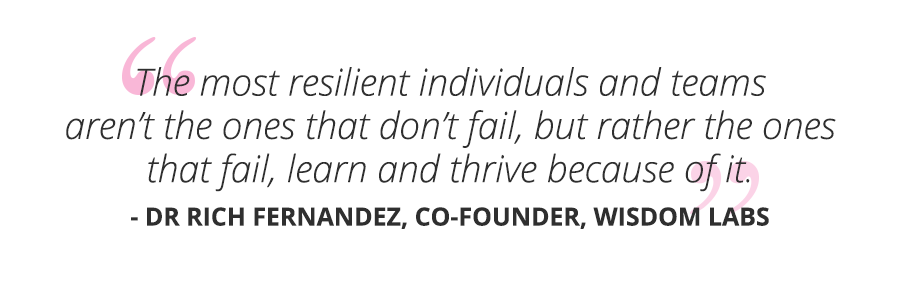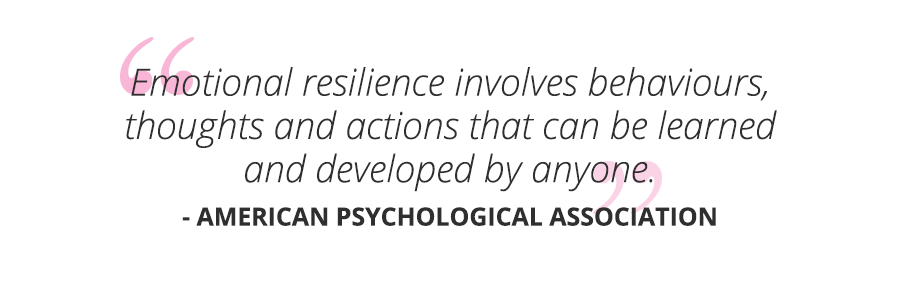Why should you care about emotional resilience?
You’ve probably experienced it before. One of those days where everything that can go wrong seems to do so all at once. Chances are it wasn’t limited to only one day either, but rather extended over a period of a few days or even weeks.
But, somehow, you survived. You lived through the panic and anxiety to face another day. Your ability to handle that stress is known as your emotional resilience. And if you want to move up in your career and take on more responsibility, you’re going to need a lot of it.
What is emotional resilience?
Emotional resilience is, quite simply, your ability to adapt to stressful situations or crises. Author and Stress Management Expert, Elizabeth Scott describes emotionally resilient people as those who are able to “roll with the punches” and adapt to adversity without experiencing lasting negative effects.1
 It’s worth bearing in mind that emotional resilience is not about being immune to stress. The American Psychological Association reminds us that “Being resilient does not mean that a person doesn’t experience difficulty or distress. In fact, the road to resilience is likely to involve considerable emotional distress.”2
It’s worth bearing in mind that emotional resilience is not about being immune to stress. The American Psychological Association reminds us that “Being resilient does not mean that a person doesn’t experience difficulty or distress. In fact, the road to resilience is likely to involve considerable emotional distress.”2
Why does emotional resilience matter?
According to a survey of employee assistance programs involving over 100,000 employees from across the globe, depression, stress and anxiety were responsible for 82.6% of emotional health cases in 2015, up from 55.2% in 2012.3

This rather alarming rise in stress-related emotional issues in the workplace can be attributed to two factors: Increased demand for high performance in the workplace, and lack of strong emotional resilience.
Stress isn’t all bad, however. There are benefits of experiencing small to medium amounts of intermittent stress, also known as motivational or productive stress. The Yerkes–Dodson law argues that employee productivity increases when exposed to moderates amount of anxiety, but sharply declines when that anxiety increases past a certain threshold.4

That threshold is where emotional resilience comes in. If your levels of workplace anxiety upset the sensitive productivity-stress balance, your ability to handle the situation is determined by the strength of your emotional resilience.
But resilience is not only about succeeding in the face of challenge, but learning from failure too. Dr Rich Fernandez, co-founder of Wisdom Labs, says “While working as a director of learning and organization development at Google, eBay and J.P. Morgan Chase, and in my current work as co-founder of the learning solutions company Wisdom Labs, I’ve seen over and over again that the most resilient individuals and teams aren’t the ones that don’t fail, but rather the ones that fail, learn and thrive because of it.”5

How do you undersell your own emotional resilience?
Before trying to figure out ways to develop resilience, it’s worth taking a look at your current ability to handle stressful situations. Andy Molinsky, Professor of Organisational Behaviour at Brandeis International Business School, claims there is a large disparity between what people think they can handle and what they can actually bear.
“Like many of us, my students systematically underestimate their resilience in challenging situations. Their fears about being assertive, speaking in public, and networking are a completely unhelpful, inaccurate guide to what it will be like when they actually take the leap and stretch outside their comfort zones,” says Molinsky.6

Chances are your perceived emotional resilience is a lot lower than your actual emotional resilience. Here are few insights gained from Molinsky’s experience in organisational behaviour and teaching people to deal with anxiety and stress:
- You’re more flexible than you give yourself credit for
- You’re braver than you realise
- The situation you’re stressed about is probably not as bad as you believe
- You have more resources than you think
How do you build emotional resilience?
Emotional resilience is not something you either do or do not have, it’s a trait you can work on and build. The American Psychological Association argues “emotional resilience involves behaviors, thoughts and actions that can be learned and developed by anyone.”7

While emotional resilience can be trained by anyone, there is no ‘one size fits all’ strategy to doing so. According to the APA, “Developing resilience is a personal journey. People do not all react the same to traumatic and stressful life events. An approach to building resilience that works for one person might not work for another.”
Here are Dr Fernandez’s five tips for building emotional resilience at work:
- Exercise mindfulness. A form of meditation, mindfulness involves bringing current experiences, both internal and external, to your attention. This allows you to assess potentially stressful situations in their entirety. It has been shown to enhance cognitive flexibility8 and facilitate job performance.9
- Compartmentalise your cognitive load. According to Shawn Achor, author and co-founder of the Institute for Applied Positive Research, of the 11 million bits of information your brain receives every second, you can only process 40.10 While you can’t decrease the amount of stimuli you’re exposed to, focusing your mind on specific activities for set times enables you to better deal with them without feeling overwhelmed.
- Take detachment breaks. Energy and mental focus cycles are typically 90-120 minutes long, and taking a brief time-out between these cycles has been shown to increase energy levels, mental clarity, creativity and focus.11 The long-term results of taking breaks are a preservation of energy and avoidance of burnout.
- Develop mental agility. Stressors need to be dealt with in a healthy way, which means you need to be responsive rather than reactive. Psychologist Linda Graham suggests you “pause, step back, reflect, shift perspectives, create options and choose wisely.”12 This skill is known as “response flexibility”, and saves you from reacting emotionally during high-stress scenarios.
- Cultivate compassion. Research cited by the Greater Good Science Center at UC Berkeley shows that compassion increases positive emotions, creates positive work relationships, and increases cooperation and collaboration,13 all vital steps in ensuring that emotional resilience is built and unnecessary stress is avoided.
Ready to challenge yourself and grow your skill set to take on more responsibilities at work?
Browse more than 60 short courses from the world’s leading universities.
1 VeryWell
2 APA
3 Workplace Options
4 HBR
5 Rich Fernandez
6 HBR
7 APA
8 Consciousness and Cognition
9 Rice Business Wisdom
10 Forbes
11 ScienceDaily
12 Linda Graham
13 UC Berkeley